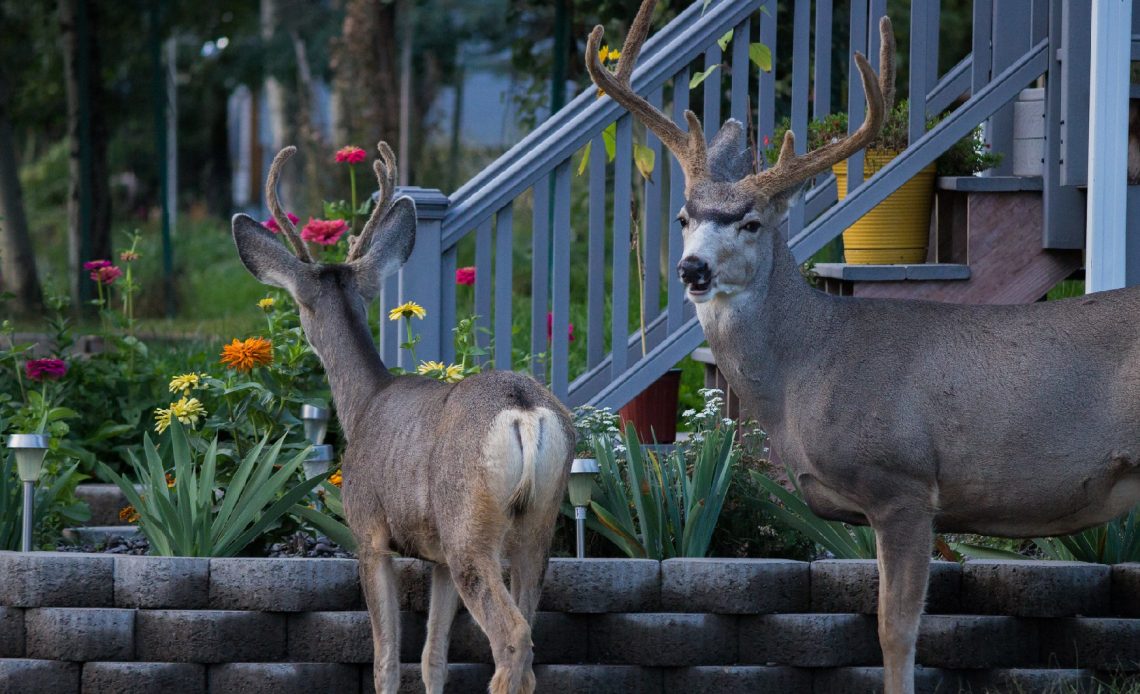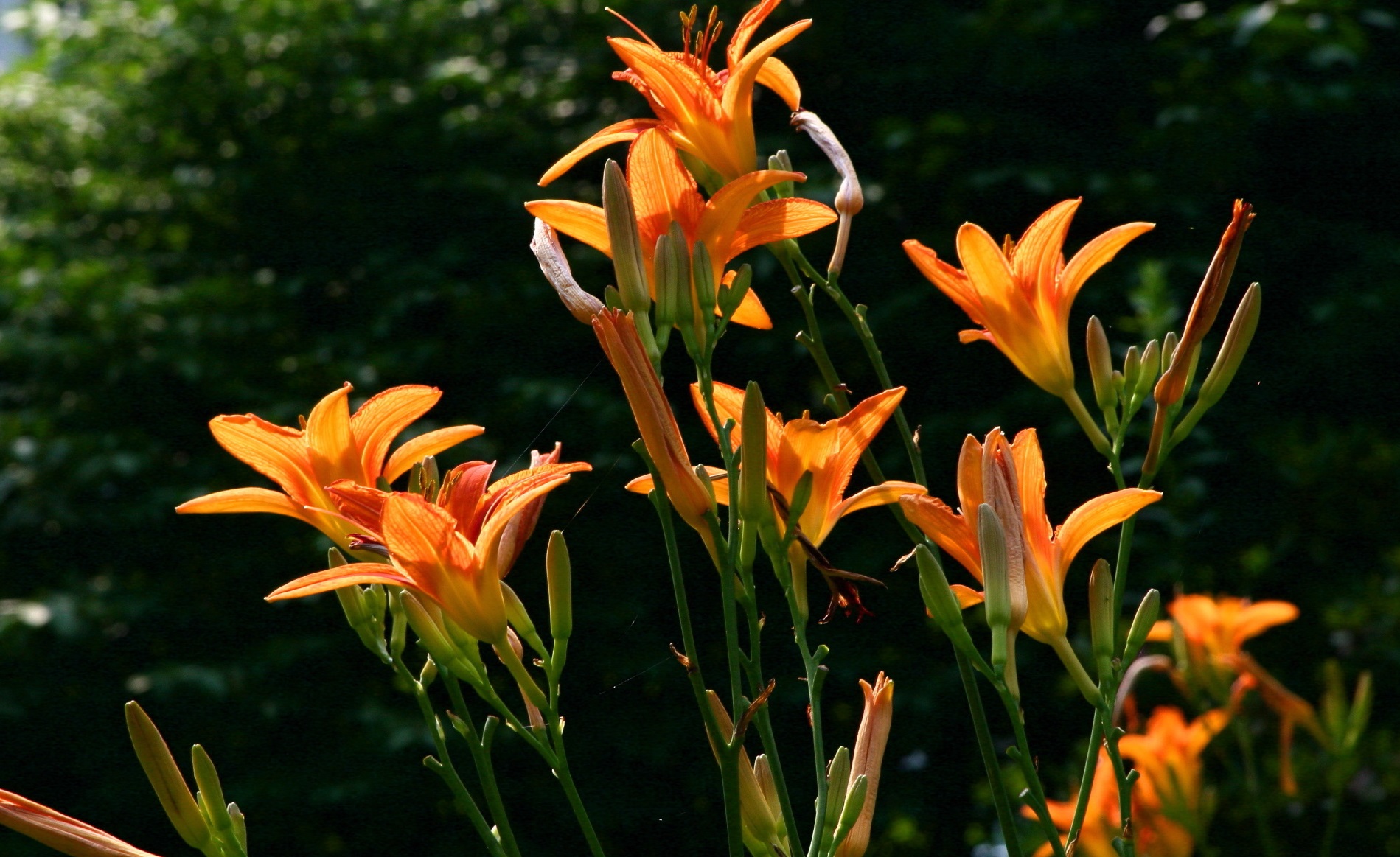

We’re here to help! Wild Yards is a completely free website that is 100% dedicated to helping you create a wildlife-friendly, sustainable yard. Read more
WildYards is reader-supported. When you buy a product through a link on our site, we may earn a comission. Every product is independently selected by our (obsessive) editors and our reviews are unbiased and objective. Read more about our mission or our privacy policy.
Daylilies are easy to grow, adding a fuss-free splash of color to flower beds and backyard gardens. But if you’re trying to discourage the local deer herd from eating your landscaping, you may be wondering if these dainty blossoms are worth your time. So, are these flowers wildlife-resistant, or do deer eat daylilies?
Yes, deer eat daylilies. However, for some deer, these vibrant blooms just don’t hit the spot. Whether or not your local deer will enjoy eating daylilies depends on their personal tastes and what other foliage is available.
Why do deer eat daylilies?
Daylilies are an excellent source of protein, especially for young deer and nursing does, who emerge in the spring to nibble on new growth. Because daylilies are ornamentals, they’re often taken care of, enjoying a healthy dose of fertilizer annually. All of this extra attention makes them especially appealing to the deer.
So the answer to “why do deer eat daylilies?” is because they’re incredibly nutritious. Flowers that are pampered are tastier than grasses and weeds. They contain more valuable vitamins and minerals and are generally a better source of moisture because they get watered on a regular basis.
But, as daylilies age, their nutritional content declines. If a deer has plenty of other foraging options to choose from, they may decide your daylilies aren’t worth their time. So whether or not your local herd will enjoy eating these flowers comes down to whether or not they’re deficient in nutrients, and which other foods they have at their disposal.
Do deer eat daylilies of all varieties?
Your deer may prefer native species daylilies to hybrid varieties. Hybrid flowers that have been cultivated for their looks may bloom over and over again, but they’re low on pollen and nectar, as a rule. So they don’t smell as strong or taste as sweet as native flower varieties. It’s for this reason that butterflies prefer native lilies, too.
If you have unhybridized daylilies, the deer will likely snack on them over hybridized daylilies, such as the popular ‘Bright Sunset’ and ‘Siloam Double Classic’ varieties. However, deer will still browse on these hybrid flowers if they’re the only ones available, especially if the deer simply like the taste of daylilies.
It’s also worth noting that deer are more likely to eat daylilies when they’re planted with other plants that deer enjoy. For instance, deer just love eating petunias and clematis. If you’ve got these plants growing in pots or beds near your daylilies, the deer will be encouraged to snack on them all.

Are there any daylilies that are deer-resistant?
Truth be told, there are very few flowers that are 100% deer-proof. But if you’re determined to include daylilies in your flower garden, and you want to maximize your chances of keeping the deer disinterested, look for the ‘Stella de Oro’ daylily. This cultivar has been specifically designed to be deer resistant.
Like all daylilies, ‘Stella de Oro’ thrives in full to partial sun and performs best when given plenty of water. Though this flower prefers nutrient-dense soil that’s full of organic matter, it’s a hardy little plant that can grow in sandy soils, too. It’s suited to zones 3 through 10 and produces gorgeous yellow trumpet-shaped flowers from early spring all the way through to fall.
Even though the ‘Stella de Oro’ daylily is the most deer-resistant daylily on the market today, it can still be susceptible to deer, especially when it’s just starting to sprout. The deer love to feed on sugar-rich new growth, even that of the plants they hate. So it’s important to take a few precautionary measures to keep your daylilies safe from ravenous deer.
Can companion planting stop deer from eating your daylilies?
Another way to deter the deer from your daylilies is by planting them with other flowers and plants that deer dislike. While it is true that deer will eat just about anything, they are far less likely to nibble on aromatic plants as well as those that have prickly, irritating foliage.
Ferns
Ferns provide an excellent backdrop for flower beds, but they’re a popular choice among landscapers for another reason, too. Deer are very reluctant to nibble on their stiff, rough foliage. Mature ferns aren’t at all like the delicate new leaves deer like to eat best. Growing ferns with your daylilies will improve their chances of survival.
Marigolds
Do deer eat daylilies? Yes, but they probably won’t bother to try if you plant marigolds in front of them. Both bees and deer hate marigolds. These flowers are not a great source of pollen, which makes them low in protein. Plus, they smell bad, and their ruffled, fuzzy texture irritates the delicate membranes of a deer’s mouth.
Peonies
Peonies are incredibly fragrant. This makes them a hit with most pollinators, including bees, but deer are repulsed by the smell. They also dislike the sticky sap in the stems and the gooey nectar from the peony’s extrafloral nectaries. Peonies grow well in zones 3 through 8, so they can be very helpful for companion planting with daylilies in these areas.
Mint
This strong-smelling herb enjoys the same growing conditions as daylilies. All varieties of mint thrive in the shade and prefer damp soils. Additionally, deer are highly sensitive to the smell and will avoid it almost always. Unfortunately, many gardeners consider this plant to be invasive. So while it may help keep the deer off your daylilies, it may take over your whole garden, too.
Roses
In spite of their tender buds and fragrant blooms, deer generally dislike roses, especially certain cultivars like ‘Harison’s Yellow’. These striking yellow roses complement daylilies beautifully. But deer avoid ‘Knock Out’ roses, too, which come in a variety of other colors. Planting these flowering shrubs around your daylilies will provide a natural thorny barrier for your daylilies that deer aren’t likely to cross.
How else can you prevent the deer from eating your daylilies?
The average whitetail deer must eat seven to 10 pounds of roughage every day. That’s a tremendous amount of food, which is why they’re always grazing. Their constant hunger means you’ve got to be proactive about protecting your daylilies — and your other landscaping, too.
An excellent first step is to create a homemade deer repellent spray. Whisk an egg (preferably a rotten one, as rotten eggs are highly effective for repelling deer) with a few tablespoons of onion juice and garlic juice. Mix this concoction with some water, and use a spray bottle to apply it to your daylilies. Deer hate the taste and smell of these sulfur-rich ingredients. Don’t forget to reapply the mixture to your plants after watering them or after heavy rain.
Next, invest in red cat-eye lights. The deer see the lights peaking at them from shrubbery, and their strong “fight or flight” instinct tells them they’re being hunted, so they run away. You may have to move these lights around your yard every few nights so the deer don’t get used to them. But, overall, they’re highly effective for keeping deer and other hungry prey animals at bay.
Some deer can’t get enough of daylilies. But by choosing hybrid varieties that deer are less likely to enjoy, and by taking measures to keep the deer out of your yard, you can continue to enjoy your daylilies for years to come.
